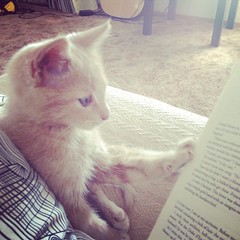I have this routine I do in the morning now. I wake up, and after bumbling around in a bit of a fog, I settle down and I stretch my neck. (Specifically, for all you bodywork types, I stretch my scalenes, which are the ropelike muscles on the side of the poor apparatus that has the burden of holding your thick, heavy skull up.) Then I meditate for a few moments (often doing my cheat-y meditations) and then do a bit of cheat-y yoga, too. And then I make a cup of something caffeinated and then settle down to write, whether it’s on my personal creative work or my job assignments.
The writing is the work, of course, but leading up to it is important. The routine is what launches me into the writing; it’s like a nice little platform or foundation for the day. Interestingly enough, the most important part of the routine are the neck stretches, not the meditation or the caffeine. (Those things are definitely nice, though!) I can truncate or skip the beverage or the Yoda mindfulness stuff, but if I skip the neck stretches, all hell breaks loose in terms of my day’s output. It’s a weird, pedestrian yet quasi-mystical thing, this morning routine.
It sounds very high-minded when I write it down, but honestly it is actually super-practical: the stretches and yoga are to counteract the beginnings of carpal tunnel I began experiencing late last year. (A lot of hand/wrist pain is related to very tight scalenes and sunken chest muscles, apparently.) A massage therapist I went to suggested to stretch out my super-tight neck muscles morning and evening — and yes, it makes a difference for my particular body. I started doing the neck stuff, and then just plastered on other things that felt nice, experimenting with the order, etc. And lo and behold — morning routine! And I didn’t even make a resolution to find one! Score!
But I’ve always had a fascination with people’s routines for the morning and evening. There’s something so personal and intimate about how people begin and wind down their days and evenings to me — something beautifully ordinary and yet very idiosyncratic. I love hearing how people deal with the practicalities of food, eating, caffeine and exercise while still trying to incorporate their creative and intellectual passions into their lives.
There’s something both humbling and inspiring about hearing how legit creative geniuses start their day, and there’s no predicting who does what in the morning. James Joyce apparently would get up at 10 but stay in bed, breakfasting and occasionally talking with his tailor, until 11 or so. Then he would get up, shave and then play the piano before he got down to the business of creating modernist prose. (This makes me feel better when I try to wake early to work on my novel and suddenly instead decide that clearing out my magazine piles and restringing my guitar are a better use of my time.)
Others are intimidatingly productive. Ben Franklin was a famously busy polymath, but found an hour every morning nevertheless to read while naked, a practice he called “air baths.” Le Corbusier started early with 6am gymnastics and painting, while Haruki Murakami gets up at 4am, writes for 5-6 hours, then goes running in the afternoon. Twyla Tharp mentions in her book The Creative Habit that she takes a cab to the gym hella early every morning to work out with a trainer to start her day. The important part of the routine isn’t the workout, it’s the cab, she specifies, which I loved.
Interestingly enough, there isn’t as much info out there on evening routines as there is for mornings — maybe because evenings feel more intimate, I’m not sure. I’m trying to find the evening equivalent of my morning routine, but surprisingly, that’s proved more elusive, and I haven’t quite settled on anything yet. Perhaps it’s because I haven’t quite figured out what the purpose of the nighttime routine is. If morning routines are to create idylls of quiet and focus, or perhaps momentum and energy — depending on who you are and what you need — then what are evenings for? To wind down? Empty your mind? Relax? Set yourself up for the next day? (For me, it should probably involve squelching the impulse to squeeze more out of the day.)
I haven’t figured out what I particularly need from my nighttime routine yet. But it’s cool. Hopefully it’ll happen as organically as the morning routine did. If there’s anything I’ve learned, routines that bookend your day are a unique extension of the person practicing them — and you can’t top-down force uniqueness, of course…it’s an inside-out thing.

 Sometimes when you’re
Sometimes when you’re 
